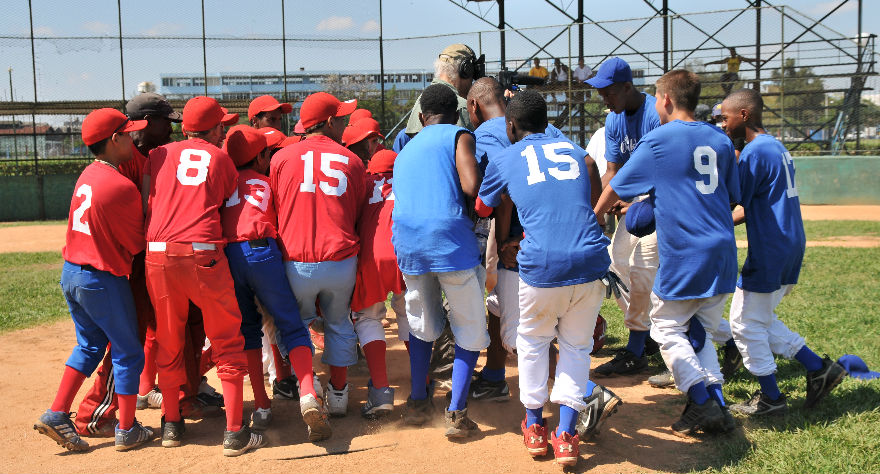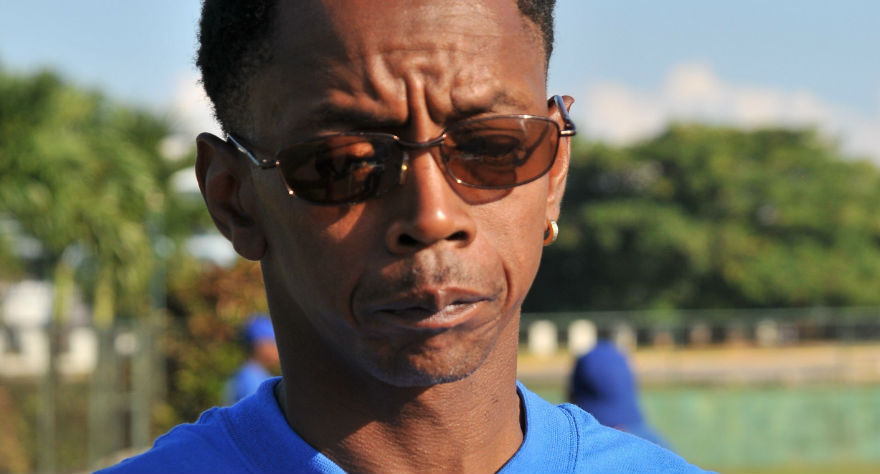‘Ghost Town To Havana’ and the Unsung Inner-City Heroes

Lifelong baseball lover Eugene Corr’s inspiring documentary how follows the lives of an inner city youth baseball team in Oakland, Calif. and their coach, Roscoe Bryant. As a way to provide hope and mentorship to the children in his violent neighborhood of Ghost Town, Bryant founded the Oakland Royals team in 2005. Over in Havana, Cuba, another coach, Nicolas Reyes, has been grooming a team of his own. The two coaches organize a game between the two teams to take place in Cuba and worlds collide as the American youths learn to adapt to Cuban culture. Close friendships are made and life lessons are learned, though Corr’s film also covers the long, hard road coach Roscoa had to getting his team to Cuba.
I spoke to Eugene and Roscoe in San Francisco, where they were promoting the film and its screening tonight at the Grand Lake Theater in Oakland. For more info on how to watch and support the film, visit ghosttowntohavana.com

Richmond is a Bay Area city that hasn’t gotten almost any big screen time before. I like that you delve a little bit into its history. I had no idea.
Eugene: There’s such a rich history and we just barely touch on it. There’s another film right now, Romeo Is Bleeding, that drills down even deeper into the history of Richmond. But there is a rich history with my father and the baseball team he coached for many years.
Talk about the transformation of Richmond from the ’50s to the ’80s.
Eugene: When I was a kid in the ’50s and into the ’60s, even into the ’70s, Richmond and Oakland were still booming industrial centers. They were labor towns, they were tough towns. I was a factory worker, forklift driver, steel worker, auto worker, crane operator. Around ’73 was when the city was really starting to decline, and I transitioned into film. Most people in the Bay Area don’t know the history of Richmond. It wasn’t like the Bay Area of today.
In those days, baseball was king. From Richmond to Oakland, so many great baseball players came from there—Curt Flood, Vada Pinson, Frank Robinson. They were great ballplayers, Hall of Fame ballplayers. Frank Robinson was the first black manager. They transformed the face of the game. There’s a whole East Bay history here that, with the decline of industry, faded away. I don’t know how many teams Oakland has now, but they used to have scores of youth baseball teams. Levels of participation for inner-city kids back then were much greater than they are now.
Oakland and San Francisco have been going through some pretty drastic transformations over the past few years.
Roscoe: I’m not happy with the changes. West Oakland has become gentrification central. I’ve seen a lot of long-term residents leave the community. There’s a housing crisis right now, and nobody’s really making a lot of noise about it. Out goes the old and in comes the new. In the last ten years, I’ve seen my neighborhood change dramatically. Houses that couldn’t be sold before because they’re in a drug zone are going like hotcakes right now. Ten years ago, the dogs in our neighborhood were pit bulls—now you see a lot of chihuahuas. [laughs] A lot of families that have been there for generations are leaving now. It’s breaking my heart.
Like is said in the movie, Roscoe’s work may not create a lot of jobs, but it gives people hope, which to me is more important than anything during this city transformation.
Roscoe: I enjoy what I do. I really enjoy working with these kids. Sometimes when I’m working I don’t realize that I’m giving these kids hope and building them into better human beings. I just enjoy it. We have our ups and downs—some days you just shake your head, others your heart explodes with joy. I had a kid who went 0-80 the entire season. He couldn’t hit nothin’. We get into our first playoff game, we’re down one run, there are two outs, and guess who comes to bat? Every kid on the team, the parents, they all went, “Oh no!” People started putting stuff in their bags, ready to leave. The kid gets a double, and we win the game. I live for this. He’ll carry that one occasion for the rest of his life.
Eugene: So many of the kids have been surrounded by death and hardship and enormous losses. That kid is never going to remember the 0-80. He’s going to remember that one double.
There were two moments in the movie that sort of stopped my heart. One was when Roscoe talks about a bullet getting lodged in his son’s mattress.
Roscoe: Shootings in my neighborhood were very common. Most of the houses had gotten shot up, but they never shot us up. The bullet in the mattress came from a shooting a block away. It traveled a whole block, came through my house, whizzed by my daughter’s head. If my son had been standing up, the bullet would have got him. It whizzed over his head and lodged into the mattress. We’re not gang bangers. We’re not involved in any drug trade, none of that. We just live in this community. It taught me how quickly our lives can be taken. You don’t have to be in the game to be a victim of it. I’m just glad nothing happened. We got rid of that mattress after we filmed that scene.
Eugene: His house got shot up half a dozen times while we were shooting. Just bullets flying in the neighborhood. His car got hit, the front of his house got hit.
Roscoe: It happens so much, you just put it in the back of your mind.
The second moment that got me is when you’re talking to one of the boys, Chris, a couple of years after the Cuba game. He’s getting straight A’s, and he says he’s doing it for his little sister to be a good role model. That’s amazing to me because it shows that Roscoe is molding these kids to be mentors themselves.
Eugene: That’s a deep bond he feels toward his little sister. I love it. He was a victim of all this stuff, and you see him begin to take agency and control his life. He’s doing good things.
Roscoe: I saw him just recently. He’ll come down to Ghost Town every now and then. It’s beautiful to watch Chris grow. You can see when some of these kids, because of the way they’re growing up, are going down that same road. I’m glad Chris played baseball for me, but I’m also glad his mom moved him out of Ghost Town. He was definitely on-track to be gang banging or following the steps of others he knew. He was definitely going down that path. To watch him grow and be this mentor to his sister meant a lot to me too. Me and Chris knocked heads a couple times, but he’s a wonderful kid.
Baseball coaches, in addition to the kids’ mentors and parents, are really ushering these boys into manhood via this sport everyone loves so much.
Eugene: I think baseball is a slow game, and to learn it requires a relationship with a coach. If it’s a good, positive coach like Roscoe who encourages effort, the kid learns that, if he keeps trying, he gets better. Roscoe’s strong and respected, which I think is essential to these kids. Not anybody could be a coach to these kids. It’s valuable that he’s somebody from the neighborhood who can relate. But baseball is such a joyous game. It’s not over in 60 minutes. There’s a promise of immortality—if you keep hitting, you could play forever. There’s an open-ended nature to it that’s quite beautiful.
Roscoe: I think baseball sets kids up for life. It gives them so many life skills. It’s a slow game, so you need to learn patience and perseverance. You also need social skills. If you want to be productive, you have to get along with each other. Baseball’s also a game of failure. If you hit three out of ten times, that’s a 300 hitter, which actually makes you a stud. But you failed the other seven times. I can’t go to my job and do three out of ten things well. [laughs] I won’t have a job much longer. Baseball teaches you to keep trying, how to deal with failure.
